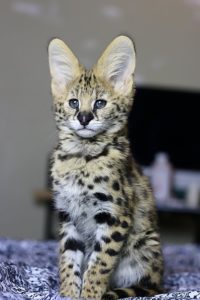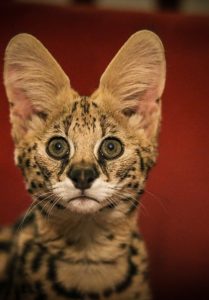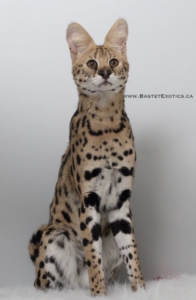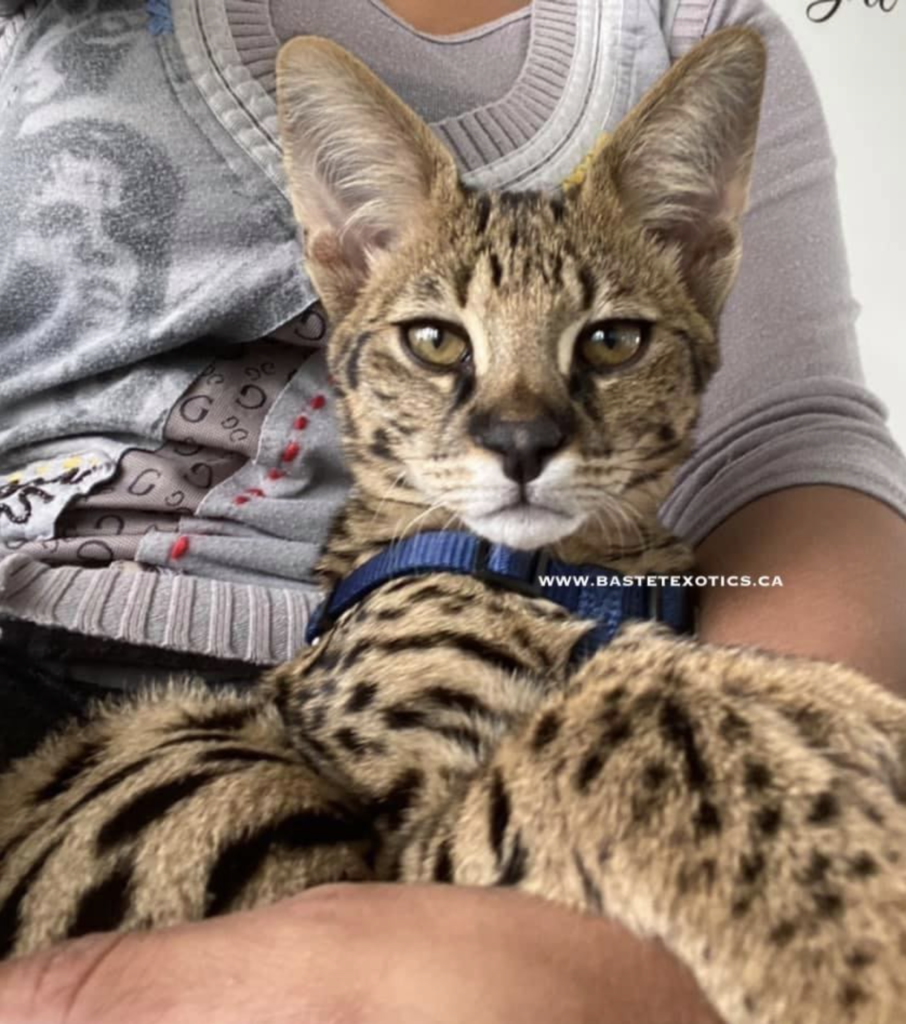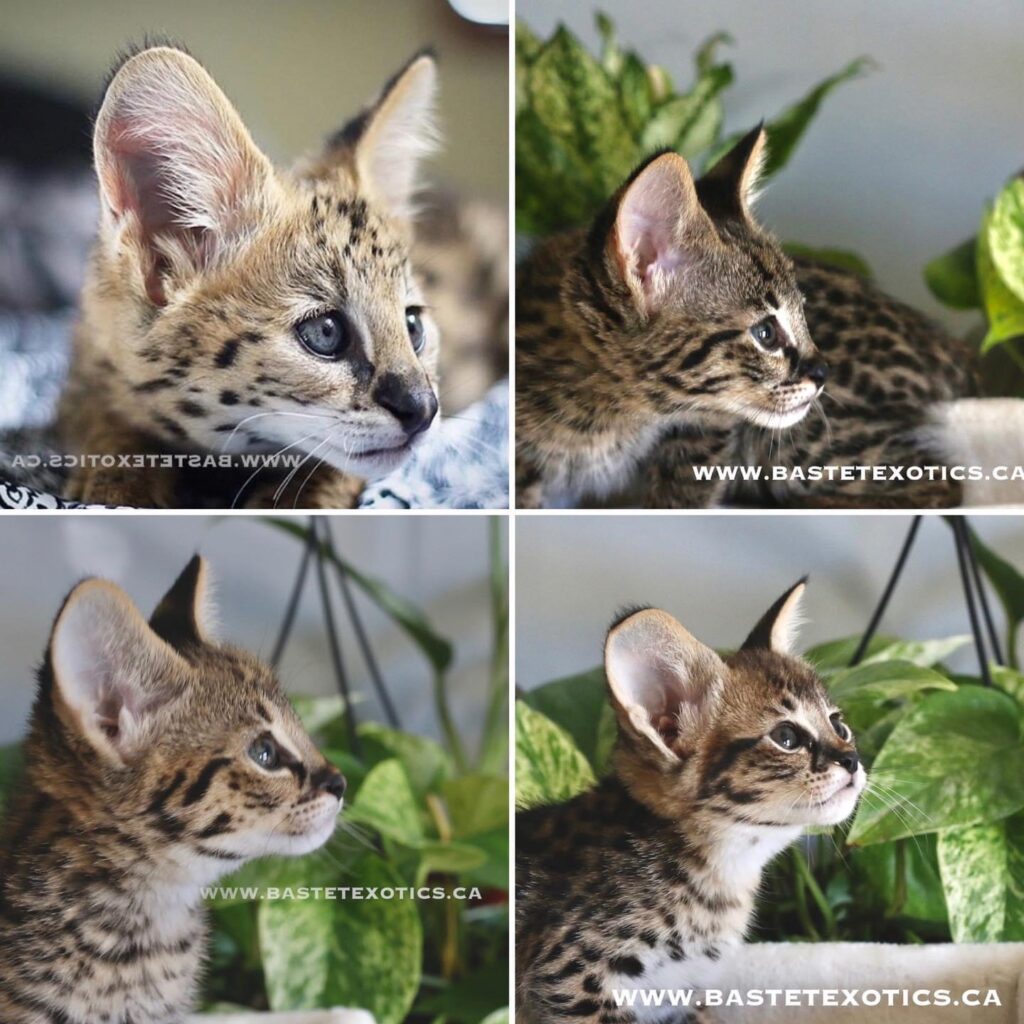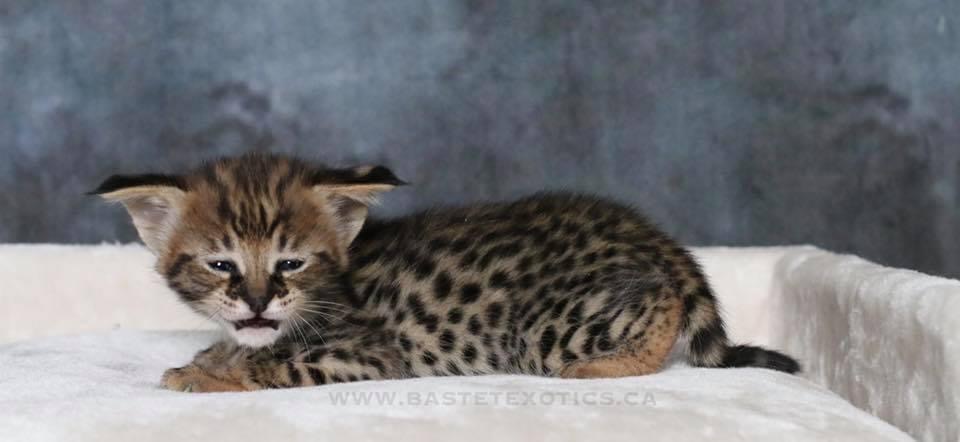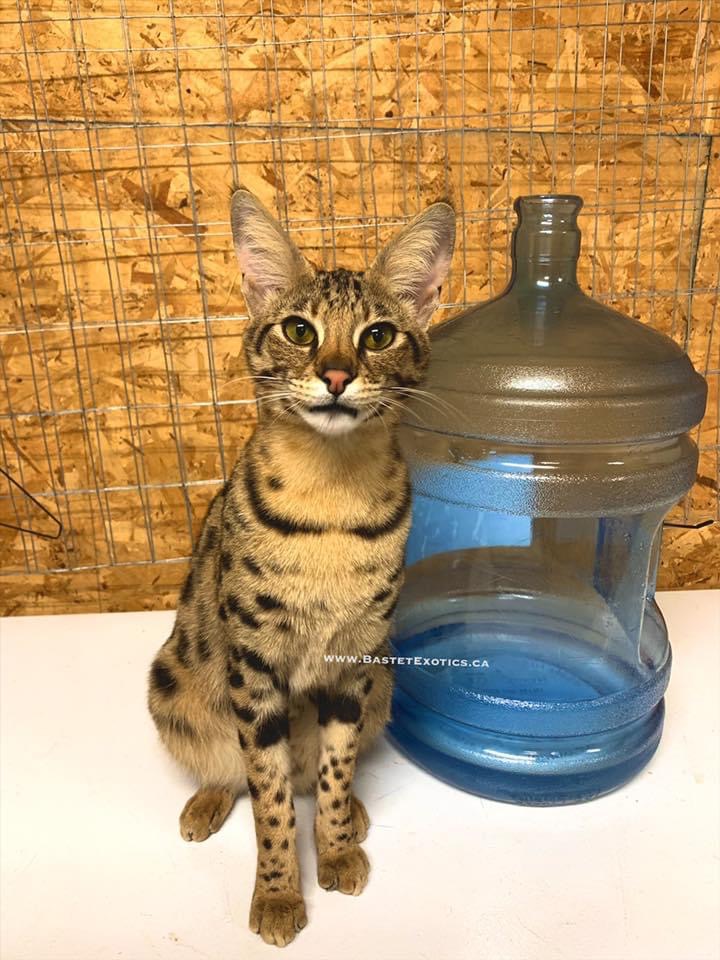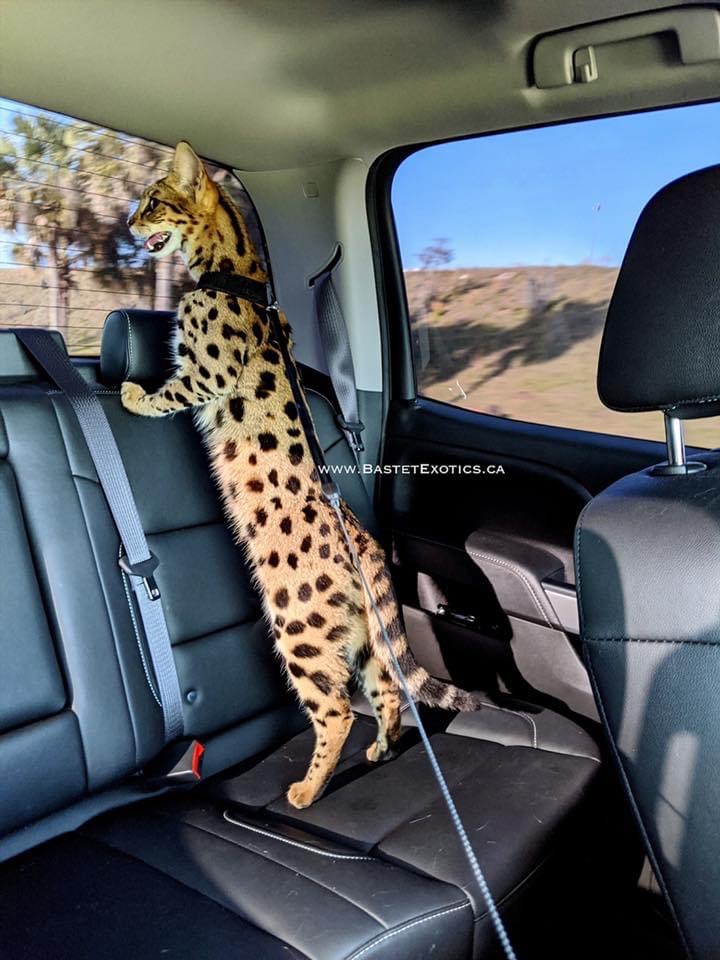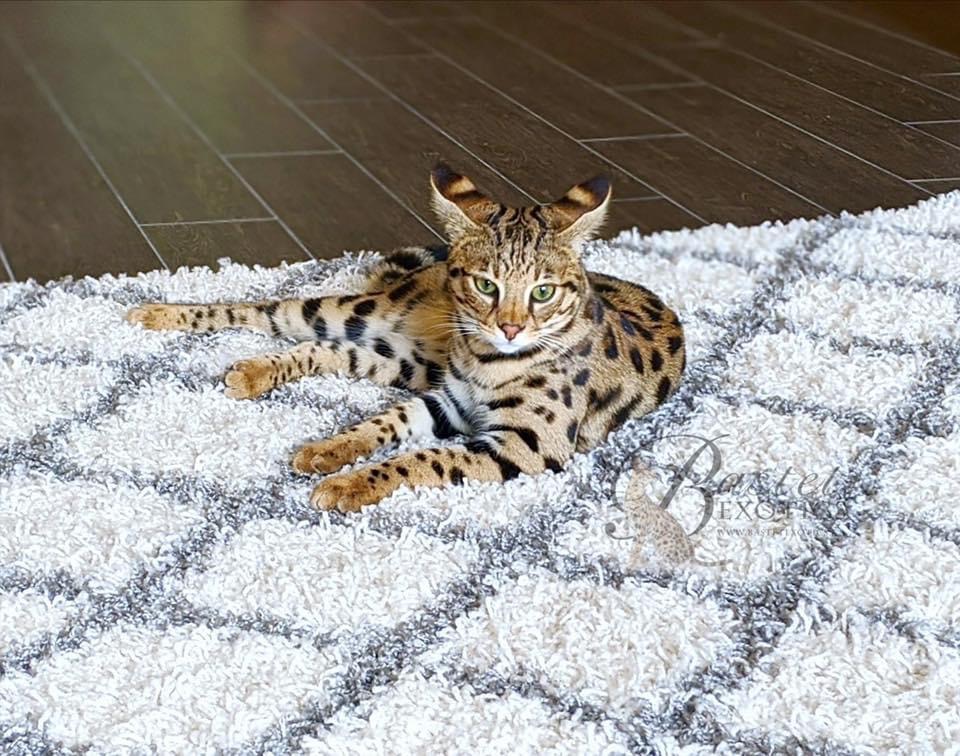Uzi is the dad to all of our amazing F1 Savannah babies born here at Bastet Exotics. He is a very social boy who loves to play and constantly be petted.
As of 2019 we are proud to announce that we will have some stunning F1 Savannah kittens available.
FAQ about F1 Savannahs
What is an F1 Savannah?
The F1 Savannah is the product of mating an African Serval to a domestic cat; we use savannah females only to ensure the highest quality of F1 Savannah kittens are produced.
Why do F1 Savannah kittens cost so much?
This is the most common question I get asked by people who are looking into brining a savannah cat into their family.
F1 Savannah’s are so expensive because of how difficult the process is to breed them.
A breeder first acquires a serval ( usually a male ) with a very high chance that he may or may not mate with the domestic females he is presented with.
When this male serval breeds the domestic ( which is a very small percentage that will ) majority of females are not able to carry kittens to full term if they are able to make it that far into the pregnancy.
The African serval pregnancy ( gestation period) is 71-72 days where as the domestic cat is 64-65 days.
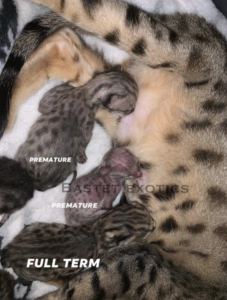
New born F1 Savannah babies just hours old
Females that are able to successfully carry this precious cargo usually will give birth to some kittens that are full term and some that are premature ( as shown in the photo to the right )
Premature kittens can range from being completely hairless to half the amount of hair (and size) of a full term kitten.
This is where the real fun starts. Being up around the clock every 30 mins to an hour feeding babies, making sure the proper temperature is kept in the birthing area, and ensuring that babies are gaining weight.
F1 Savannah kittens are extremely fragile and the mortality rate is extremely high.
How big to F1 Savannahs get?
On average F1s typically grow to 17 inches in height. F1s that are spayed and neutered young ( between 10-14 weeks of age) can exceed this height sometimes.
Savannahs are a slim cat that give the appearance of a larger cat so weight is an incorrect way to help describe “how large” F1’s grow.
Several of our F1 Savannah queens are between 15-17 inches in height and weigh in at 14-16 LB. They are extremely well balanced for their body and with a healthy body condition score.
Males do tend to be on the larger side and females not as big.

No breeder is able to guarantee any size of an F1 Savannah as a kittens. This will solely depend on genetics.
Since we are crossing 2 different species it’s hard to predict as they have several growth spurts as they grow. However, we are able to guess what size and height range they might grow by previous litters mature size/weights.
If any breeder guarantees that the kitten will get to a certain weight and size this is a huge red flag and buyers should be cautious.
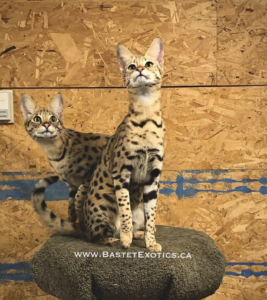
F1 Savannah sisters Eevee & Mystique
Do you produce HP F1 savannahs?
No.
I believe in selective breeding to produce high quality F1 Savannahs that give the appearance that they are a high percentage of serval.
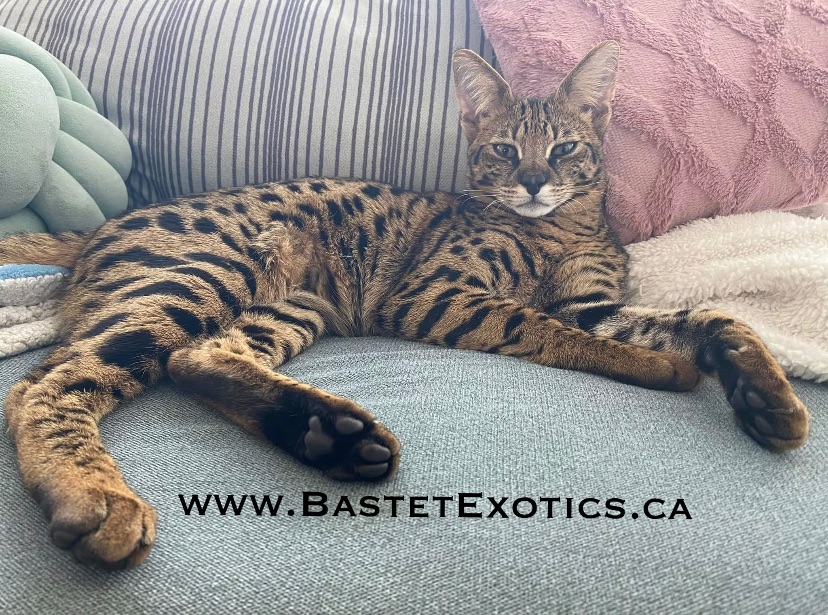
This is Rio an 8 month old F1 Savannah. His mother is an F7 girl bred with Uzi our serval.
At 8 months he has already outgrown his 3 year old F4 companion that he lives with.
How come you don’t breed an F1 female or F2 female to the serval?
There are a long list of reason as to why this is not ideal and it does not benefit the improvement of the savannah breed.
1. Many breeders have experienced mature females not being able to produce kittens due to high infertility with F1 Savannah females out of the standard serval x domestic matings.
2. F1’s coming from Serval x F1/F2 matings will exhibit serval like behaviours. This includes the undesirable ones such as their destructive behaviour, spraying, and heath issues that can arise from not having a nutritionally balanced diet to facilitate for proper bone health.
3. Owners would need to provide these type of F1s the exact same care serval owners provide to their servals.
4. They do not advance the breed as females from serval x F1/F2 matings have more fertility issues, those that are able to produce can pass on some fertility issues in further generations where it is vital for males to be fertile. Example : creating fertility issues in generation 6&7 males.
5. Extremely hard to re-home if that issue ever arose and there are not many people willing to take in
6. In many states and provinces Servals ownership illegal. If the authorities are not able to differentiate a clear difference between a serval and an F1 Savannah, this puts a risk to that F1 Savannah.
7. Kiss Vacations goodbye…..Like servals , F1 Savannah, coming from Serval x F1/F2 savannah matings, will be extremely bonded with their owners and finding someone who will come to care for your cat will be extremely difficult. Just like servals, they can become depressed and stop eating which will create other issues.
Although kittens born from this matings are very eye catching, it is not something that ethical breeders who are looking to advance and improve the breed will do.
Ethical breeders will selectively breed to produce a similar look without the hardships of serval ownership attached with their F1 Savannahs.
- F1 Savannah male
- Serval & F1 Savannah profile comparison
- F1 Savannah female 3 weeks
- F1 Savannah female sitting next to 5 Gallon water jug
- F1 Savannah male
- F1 Savannah male
- Serval VS F1 Savannah
Can I take my F1 Savannah places?
Yes! I highly encourage taking your savannah (any generation) out to different places. This will help desensitize them to all different sights, smells, and is a great way to bond + mentally stimulate at the same time.
Many owners will take their F1’s hiking, camping, to the pet stores, car rides, visit the staff at the vet clinic, or even just a stroll in the neighbourhood.
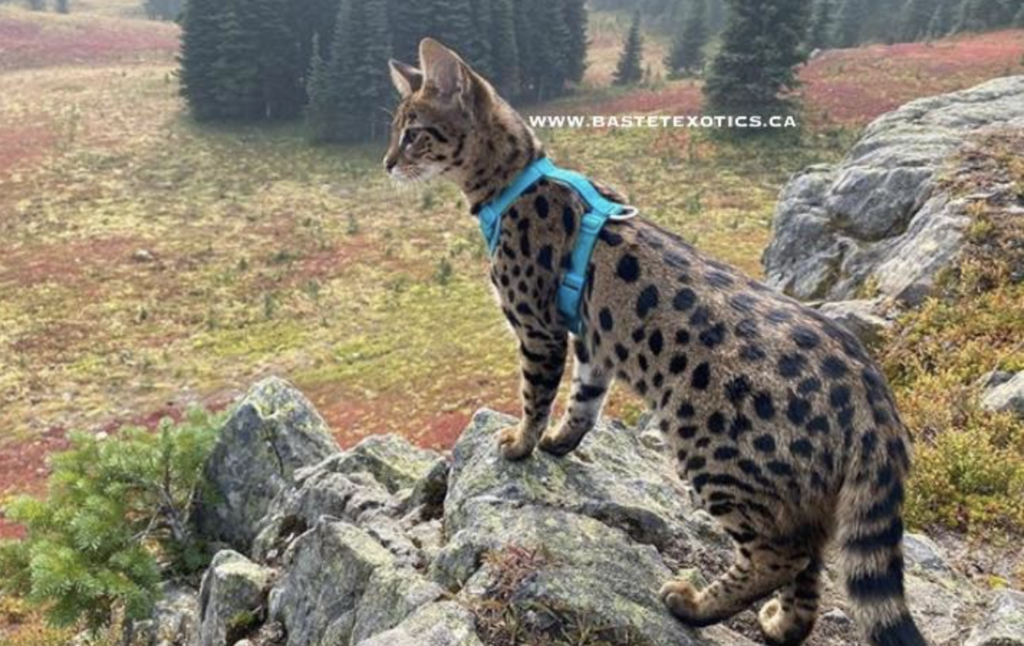
F1 Savannah on a hike in the mountains
I always encourage getting them used to outings in the vehicle so that when it comes time to going to the vets for their check up, it will be a breeze. Many of our amazing cat families will take their kittens/cats all over the place.
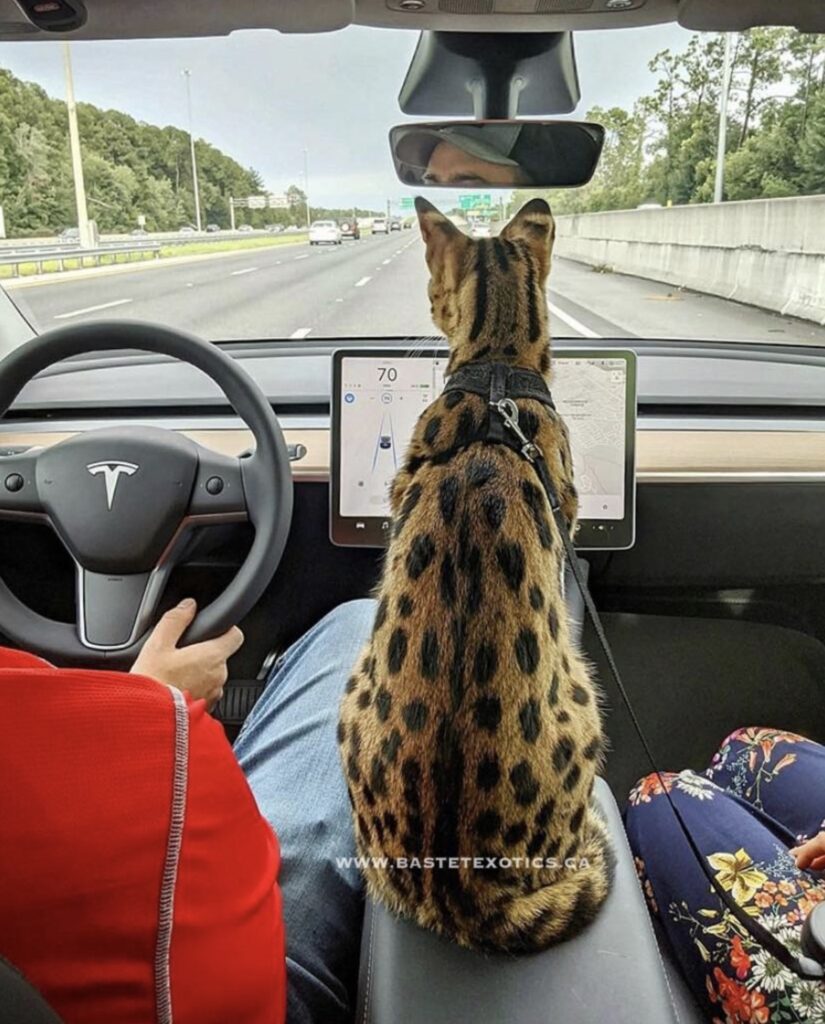
F1 Savannah going for a car ride
If you are planning to take your kitten out it is highly recommended to continue harness training as they grow.
Are F1 Savannahs legal to own anywhere?
The first step is to find out if F1 Savannahs are legal to own where you live.
- Does the country you reside allow F1 Savannahs?
- Does the State or Province you reside allow F1 Savannahs?
- Does the city, county or municipality allow F1 Savannahs?
These 3 questions are important as there are different rules as to where you reside.
Example:
Canada as a country permits F1 Savannah ownership as a country.
Provincially there are many places that ownership of F1 Savannah is banned, like Alberta where F4 and later are permitted only.
Provinces like British Columbia allow all generations to be owned, however, each municipality has its own rules for ownership. For example, Vancouver allows ownership of F1 Savannahs but in New Westminster only F4 savannah and later ( F5,f6 etc )are permitted.
There are countries, like Australia, where ownership of all Savannahs is illegal.
I do not live in Canada but I want a kitten from you. What is this process?
To export F1 Savannahs out of Canada and to a different country there are special permits and procedures required to do so.
Canadian CITES for Export is MANDATORY when exporting any F! Savannahs ( this includes F2-F4 generations)
Each country has their own set of special rules for importing CITES animals and animals in general. These are MANDATORY requirements to LEGALLY import/export.
Example :
Sending a kitten from Canada to USA (hand delivering)
- A Canadian CITES export permit is required.
- Canadian Border Services must inspect and endorse the CITES to clear the cat/kitten for export.
- A valid USA import/export commercial licence is required.
- US Fish & Wildlife Edec must be completed prior to entering the USA
- US Fish & Wildlife inspection is required.
These are all mandatory steps required by both governments and it is vital that all steps are complete
I want an F1 Savannah, what are the steps?
Due to how difficult it is to produce F1 Savannah kittens it is highly recommended to to get on to our waitlist.
This will guarantee your spot for picking a kitten when they are born. As kittens are born they are offered to those on our waitlist.
Kittens are always reserved by waitlist as they are born.


